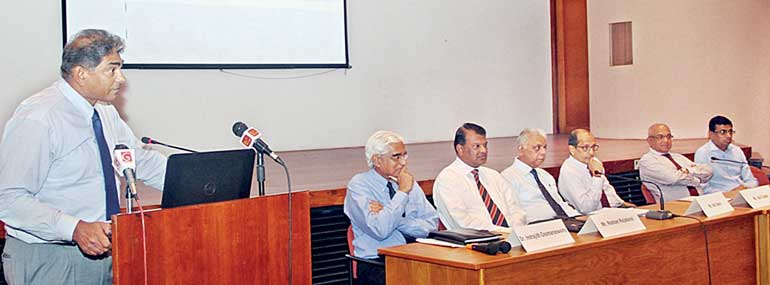Thursday Feb 19, 2026
Thursday Feb 19, 2026
Friday, 26 February 2016 00:00 - - {{hitsCtrl.values.hits}}
 Tea Exporters’ Association Chairman Rohan Fernando addressing the gathering
Tea Exporters’ Association Chairman Rohan Fernando addressing the gathering
The Tea Exporters Association (TEA) recently conducted a workshop on tea strategy development under the theme ‘Way forward towards 2020’ at the Export Development Board- auditorium, with the participation of many distinguished stakeholders from the industry. 
Minister of Plantation Industries Navin Dissanayake graced the workshop as chief guest while the elite panel of speakers included the Advisor to Ministry of Development Strategies and International Trade Dr. Indrajith Coomaraswamy, Chairman of the Planters’ Association of Ceylon Roshan Rajadurai, Wealth Lanka Management Ltd, CEO, Mangala Boyagoda, Sri Lanka Tea Factory Owners Association Chairman Anil Alwis, Symbiosis Business Partners CEO Lasantha Abeywickrama, Calamander Group, Singapore Chairman Roman Scott and Colombo Brokers Association Chairman Anil Cooke.
The workshop was conducted in order to encourage stakeholders and policymakers to understand the future requirements of the tea industry and map-out a plan to ensure its sustainability. It also focused on four key areas of the tea sector namely; new business models for plantation and manufacturing sectors, marketing of Ceylon tea in today’s context, current trends and prospects in the global tea market along with the implications of exchange rate fluctuations on the tea industry.
“In a world where wheeler‐dealers are embraced as respectable entrepreneurs, the hard work and genuine entrepreneurship of stakeholders of a 150 year old industry goes unnoticed and most often taken for granted,” said Tea Exporters Association Chairman Rohan Fernando, having well received everyone present. He further added, “It is my privilege to stand before you to highlight the initiatives of the Tea Exporters’ Association in finding the depth of the Tea Industry and chartering a course for all stakeholders to achieve business excellence promptly. It is with this intention that we invited all stakeholders to present their business model, targeting the year 2020, to reach a turnover of US$ 5 billion in tea exports. We should look at this objectively in order to make the entire tea industry sustainable, profitable and self-reliant without having to depend on subsidies and handouts.”
In his many strategically driven solutions, Fernando also stated that the Tea Exporters’ Association came up with a model that a vast majority of its membership believed as the way forward to sustain growth and be a strong global player in tea. The brief version of the model is compressed to 15 points and a few of them were; to improve quality of tea, expedite FTA with China and Turkey, simplify the tax on tea exports, support R&D on new tea products, ease restrictions on import of foreign teas for re-export, fast track approach to increase tea production and lower the cost of production.
Expressing his views on current pressing matters of the industry, Minister of Plantation Industries Navin Dissanayake said, “In an industry where there are diverse opinions, ideas, views and going through a certain amount of change in the world, we need to select the most achievable and quantifiable one. Therefore we need to explore new models by facilitating new thought and exchange ideas as many lives depend on the sector. Marketing is an essential tool that we currently lack and due to this we are losing out on a lot of markets. Issues pertaining to the quality of raw material have also being raised and our ministry has already appointed a special committee to prepare a quality charter and I urge all stakeholders to sign it and understand the processes that are necessary to achieve a minimum standard for Sri Lankan tea.”
The Planters Association of Ceylon expressed the following views; mechanisation of field operations and the reduction of the labour intensive nature of plantation operations while affirming that politics should be separated from economics of the industry; proposed that productivity based wages and revenue sharing wage models are required for the sustainability of the Plantation sector and that a new autonomous social business enterprise model is to be developed by them and indicated that they should receive a bigger share of retail price of tea. They also stated that they would work harder towards enhancing the quality of life of the workers while working along with the state to bear the social cost of the plantation population and provide services and amenities as done for the other sectors.
Other salient proposals and strategies made at the workshop were; that we should move away from traditional markets and producing locally branded products and focus more on product innovation and current global trends in order cater to the rich Western markets who have sophisticated consumers with buying power; while statements were made that almost 2 million people depend on the tea industry, directly or indirectly and that they need to pay more attention to their safety when new initiatives are introduced.